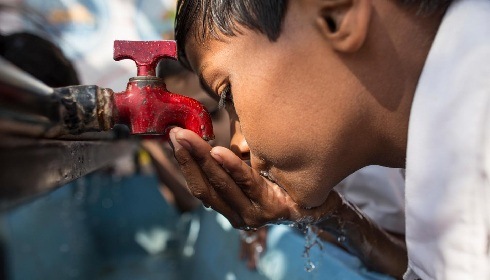
1 in 4 people across the globe still does not have access to safe drinking water: UN Bodies
A quarter of the global population still does not have access to safe drinking water despite over two billion people gaining access over the past two decades, a new report by the World Health Organisation (WHO), UN children’s agency, UNICEF, and the World Bank has revealed.
Noting that the progress made during the past twenty years is being eaten up the progress as a result of uncertainties brought about by climate change, the UN bodies said that the changing climate is increasing the frequency and intensity of droughts and floods, which exacerbate water insecurity, disrupt supplies and devastate communities across the globe.
“Providing greater access to safe drinking water has saved many lives, most of them children. But climate change is eating into those achievements,” said Dr Maria Neira, WHO Director, Department of Environment, Climate Change and Health.
“We have to accelerate our efforts to ensure every person has reliable access to safe drinking water, something that is a human right, not a luxury,” she added.
Illustrating examples of how countries are contributing to the Sustainable Development Goal (SDG) target of reaching safely managed drinking water for all by 2030, the report provides a comprehensive review of the links between water, health, and development, with actionable recommendations for governments and partners.
“Investing in water and sanitation is critical to health, economic growth and the environment. Healthier children become healthier adults who then contribute more to the economy and society”, said Saroj Kumar Jha, Director of the World Bank Group's Water Global Practice.
Stressing that the principle is at the core of the World Bank’s human capital project, he added, “Governments and private sector must take critical action now to accelerate inclusive and sustainable water supply and sanitation services in both urban and rural areas.”
The report further stressed that to provide universal access to safe drinking water by 2030, governments and partners must dramatically increase political commitment to drinking water and quadruple investments.
The report recommends that the countries should strengthen existing institutions by filling gaps, facilitating coordination, establishing a regulatory environment supported by legislation and standards for service quality, and ensuring enforcement.
It further recommends that along with increased funding, the countries should invest in capacity building within the water sector by developing a capable and motivated workforce and ensuring the availability of relevant data and information.
“No child should be faced with the choice of drinking dirty water, a leading killer of children, or making dangerous journeys to collect water and missing out on school,” said Aidan Cronin, UNICEF Interim Director of Water, Sanitation, and Hygiene (WASH) and Climate, Environment, Energy, and Disaster Risk Reduction (CEED).
“Accessible and reliable safe drinking water is fundamental to ensuring children are healthy, educated, and thriving,” he added.